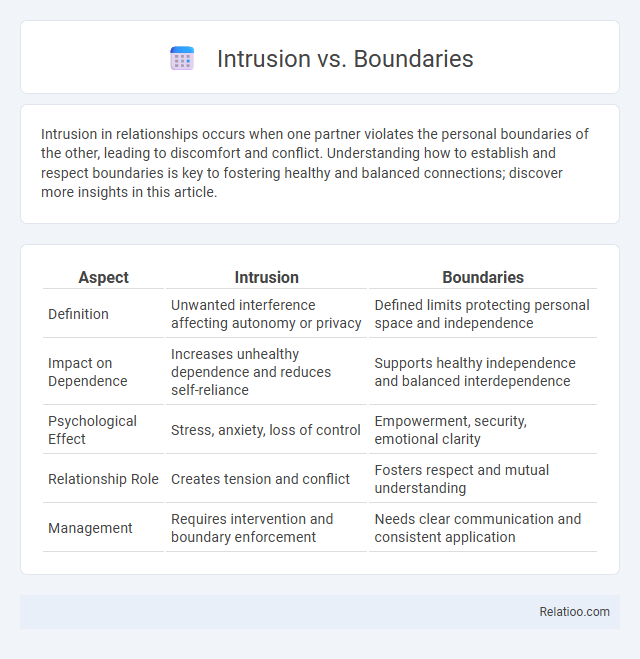Intrusion in relationships occurs when one partner violates the personal boundaries of the other, leading to discomfort and conflict. Understanding how to establish and respect boundaries is key to fostering healthy and balanced connections; discover more insights in this article.
Table of Comparison
| Aspect | Intrusion | Boundaries |
|---|---|---|
| Definition | Unwanted interference affecting autonomy or privacy | Defined limits protecting personal space and independence |
| Impact on Dependence | Increases unhealthy dependence and reduces self-reliance | Supports healthy independence and balanced interdependence |
| Psychological Effect | Stress, anxiety, loss of control | Empowerment, security, emotional clarity |
| Relationship Role | Creates tension and conflict | Fosters respect and mutual understanding |
| Management | Requires intervention and boundary enforcement | Needs clear communication and consistent application |
Understanding the Concept of Intrusion
Intrusion refers to the act of entering or interfering with a space, system, or relationship without permission, often violating established boundaries. Understanding intrusion is essential for recognizing when your personal, physical, or digital boundaries are compromised, enabling appropriate responses to protect privacy and security. Clear knowledge of intrusion helps differentiate between acceptable boundary-setting and unwanted interference, enhancing overall safety and respect in various contexts.
Defining Personal Boundaries
Defining personal boundaries involves recognizing and respecting the limits that separate your private space from others' influence, which is crucial in preventing emotional or physical intrusion. Intrusion occurs when these boundaries are violated without consent, leading to discomfort or harm. Establishing clear boundaries empowers you to maintain control over your environment and relationships.
Key Differences Between Intrusion and Boundaries
Intrusion involves unauthorized or unwanted entry into a physical or personal space, violating privacy or security, whereas boundaries define personal limits that regulate interaction and protect emotional or physical well-being. Your understanding of boundaries is essential to prevent intrusion and maintain healthy relationships by clearly communicating what is acceptable. Recognizing the distinction helps you enforce personal space without unnecessarily isolating yourself or others.
Psychological Impact of Intrusion
Psychological intrusion disrupts mental boundaries, leading to increased stress and anxiety by violating personal space and autonomy. Intrusions can cause feelings of vulnerability and loss of control, negatively affecting emotional well-being. Maintaining clear psychological boundaries is crucial for protecting mental health and fostering resilience against intrusive experiences.
The Importance of Healthy Boundaries
Healthy boundaries are essential for maintaining your emotional well-being and protecting personal space from intrusion. Clear boundaries help prevent unwanted intrusion by defining acceptable behaviors and fostering respectful interactions. Prioritizing boundary-setting strengthens relationships and reduces conflict, ensuring a balanced and secure environment.
Signs Your Boundaries Are Being Crossed
Signs your boundaries are being crossed include feeling uncomfortable, anxious, or resentful during interactions, and noticing that your personal space, time, or values are frequently disregarded. Intrusion involves an unwelcome or forceful entry into your physical or emotional space, while boundaries are the limits you set to protect your well-being and autonomy. Recognizing consistent signs such as guilt, frustration, or a loss of control can help identify when intrusion has breached your established boundaries.
How to Respond to Intrusion
Responding to intrusion involves recognizing the breach of personal or physical boundaries and taking immediate action to protect yourself. Your response should include asserting your boundaries clearly, seeking help if necessary, and documenting the incident for evidence. Establishing and communicating firm boundaries reduces the risk of future intrusions and reinforces your personal security.
Strategies for Setting Effective Boundaries
Setting effective boundaries involves clearly communicating your limits while respecting others' needs to prevent unwanted intrusion. Strategies include defining your personal space, using assertive language to express your expectations, and consistently reinforcing your boundaries to maintain mutual respect. Your ability to uphold these boundaries helps reduce emotional intrusion and fosters healthier relationships.
Intrusion in Relationships: Common Examples
Intrusion in relationships often involves violating personal boundaries, such as constant monitoring of your partner's activities or unsolicited interference in their decisions. Common examples include checking phones without permission, excessive questioning about friends or plans, and disregarding emotional needs or privacy. Understanding the difference between healthy boundaries and intrusion is essential to maintain respect and trust in your relationships.
Empowering Yourself: Maintaining Boundaries
Empowering yourself involves clearly defining intrusion and boundaries to protect your personal space and well-being. Understanding the difference helps you recognize when someone crosses your limits and enables you to assert your rights effectively. Your ability to maintain strong boundaries ensures healthier relationships and fosters self-respect.

Infographic: Intrusion vs Boundaries
 relatioo.com
relatioo.com